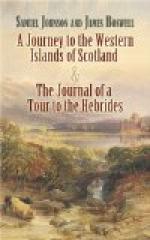Maclean being thus preserved from death, in time recovered his original patrimony; and in gratitude to his friend, made his castle a place of refuge to any of the clan that should think himself in danger; and, as a proof of reciprocal confidence, Maclean took upon himself and his posterity the care of educating the heir of Maclonich.
This story, like all other traditions of the Highlands, is variously related, but though some circumstances are uncertain, the principal fact is true. Maclean undoubtedly owed his preservation to Maclonich; for the treaty between the two families has been strictly observed: it did not sink into disuse and oblivion, but continued in its full force while the chieftains retained their power. I have read a demand of protection, made not more than thirty-seven years ago, for one of the Maclonichs, named Ewen Cameron, who had been accessory to the death of Macmartin, and had been banished by Lochiel, his lord, for a certain term; at the expiration of which he returned married from France, but the Macmartins, not satisfied with the punishment, when he attempted to settle, still threatened him with vengeance. He therefore asked, and obtained shelter in the Isle of Col.
The power of protection subsists no longer, but what the law permits is yet continued, and Maclean of Col now educates the heir of Maclonich.
There still remains in the Islands, though it is passing fast away, the custom of fosterage. A Laird, a man of wealth and eminence, sends his child, either male or female, to a tacksman, or tenant, to be fostered. It is not always his own tenant, but some distant friend that obtains this honour; for an honour such a trust is very reasonably thought. The terms of fosterage seem to vary in different islands. In Mull, the father sends with his child a certain number of cows, to which the same number is added by the fosterer. The father appropriates a proportionable extent of ground, without rent, for their pasturage. If every cow brings a calf, half belongs to the fosterer, and half to the child; but if there be only one calf between two cows, it is the child’s, and when the child returns to the parent, it is accompanied by all the cows given, both by the father and by the fosterer, with half of the increase of the stock by propagation. These beasts are considered as a portion, and called Macalive cattle, of which the father has the produce, but is supposed not to have the full property, but to owe the same number to the child, as a portion to the daughter, or a stock for the son.
Children continue with the fosterer perhaps six years, and cannot, where this is the practice, be considered as burdensome. The fosterer, if he gives four cows, receives likewise four, and has, while the child continues with him, grass for eight without rent, with half the calves, and all the milk, for which he pays only four cows when he dismisses his Dalt, for that is the name for a foster child.




